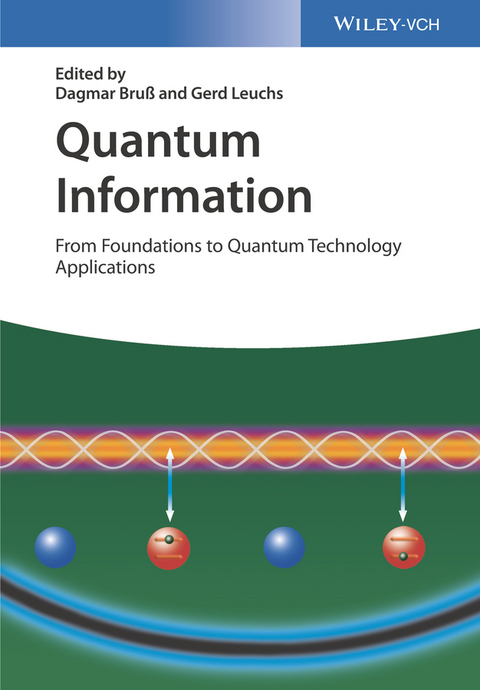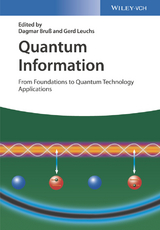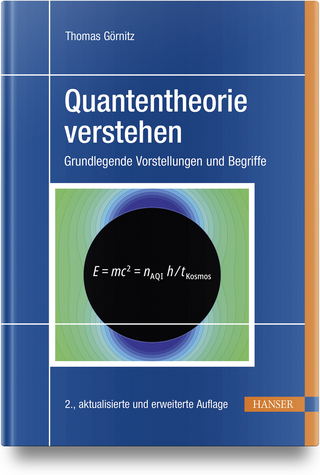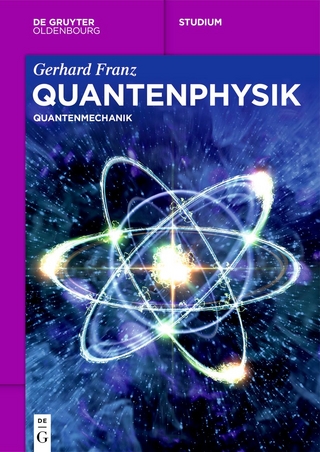Quantum Information
Wiley-VCH (Verlag)
978-3-527-41353-9 (ISBN)
Dagmar Bruß graduated at RWTH University Aachen, Germany, and received her PhD in theoretical particle physics from the University of Heidelberg in 1994. As a research fellow at the University of Oxford she became interested in quantum information. Another European fellowship at ISI Torino, Italy, followed. While being a research assistant at the University of Hannover she completed her habilitation. Since 2004 Professor Bruß has been holding a chair at the Institute of Theoretical Physics at Heinrich-Heine-University Düsseldorf, Germany. Her research pertains to theoretical aspects of quantum information processing. Gerd Leuchs studied physics and mathematics at the University of Cologne, Germany, and received his Ph.D. in 1978. After two years at the University of Colorado in Boulder, USA, he headed the German gravitational wave detection group from 1985 to 1989. He became technical director at Nanomach AG in Switzerland. Since 1994 Professor Leuchs has been holding the chair for optics at the University of Erlangen-Nuremberg, Germany. In 2009 he was a founding director of the Max Planck Institute for the Science of Light. He is visiting professor at the University of Ottawa. His fields of research span the range from modern aspects of classical optics to quantum optics and quantum information.
PART I. CLASSICAL INFORMATION THEORY
Classical Information Theory and Classical Error Correction
Computational Complexity
PART II. FOUNDATIONS OF QUANTUM INFORMATION THEORY
Discrete Quantum States versus Continuous Variables
Approximate Quantum Cloning
Channels and Maps
Quantum Algorithms
Quantum Error Correction
PART III. THEORY OF ENTANGLEMENT
The Separability versus Entanglement Problem
Quantum correlations beyond Entanglement - discord
Entanglement Theory with Continuous Variables
Entanglement Measures
Purification and Distillation
Bound Entanglement
Multiparticle Entanglement
PART IV. QUANTUM COMMUNICATION
Quantum Teleportation
Theory of Quantum Key Distribution
Quantum Communication Experiments with Discrete Variables
Continuous Variable Quantum Communication
PART V. QUANTUM COMPUTING: CONCEPTS
Requirements for a Quantum Computer
Probabilistic Quantum Computation and Linear Optical Realizations
One-way Quantum Computation
Holonomic Quantum Computation
PART VI. QUANTUM COMPUTING: IMPLEMENTATIONS
Quantum Computing with Cold Ions and Atoms: Theory
Quantum Computing Experiments with Cold Trapped Ions
Quantum Computing with Solid State Systems
Superconducting quantum circuits
Integrated wave guide quantum information processing
Quantum Computing Implemented via Optimal Control: Theory and Application to Spin and Pseudo-Spin Systems
Principles of Quantum Systems ? Theory
PART VII. QUANTUM INTERFACES AND MEMORIES
Quantum interfaces and memories: single atoms in free space
Quantum interfaces and memories: CQED
Quantum interfaces and memories: atomic ensembles
Echo Based Quantum Memory
Quantum Repeater
Quantum Interface Between Light and Atomic Ensembles
A Qubit in a cavity ? Theory
PART VIII. TOWARDS QUANTUM TECHNOLOGY APPLICATIONS: QUANTUM METROLOGY
Quantum Interferometry
Quantum Logic Spectroscopy and Optical Clocks
Frequency/Time highly Entangled Multimode Quantum States
| Erscheinungsdatum | 20.03.2019 |
|---|---|
| Sprache | englisch |
| Maße | 170 x 244 mm |
| Gewicht | 2026 g |
| Themenwelt | Naturwissenschaften ► Physik / Astronomie ► Quantenphysik |
| Naturwissenschaften ► Physik / Astronomie ► Theoretische Physik | |
| Technik ► Elektrotechnik / Energietechnik | |
| Schlagworte | Computer Science • Electrical & Electronics Engineering • Electrical & Electronics Engineering • Elektrotechnik u. Elektronik • Informatik • Informationstechnologie • Information Technologies • Physics • Physik • Quantencomputer • Quantenphysik • Quantenphysik u. Feldtheorie • Quantentheorie • Quantum Computing • Quantum Physics & Field Theory • Quantum Physics & Field Theory |
| ISBN-10 | 3-527-41353-7 / 3527413537 |
| ISBN-13 | 978-3-527-41353-9 / 9783527413539 |
| Zustand | Neuware |
| Informationen gemäß Produktsicherheitsverordnung (GPSR) | |
| Haben Sie eine Frage zum Produkt? |
aus dem Bereich




